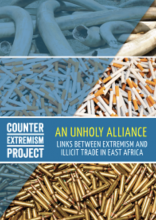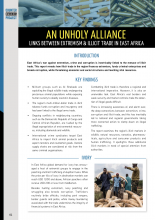
East Africa, which has experienced relative stability on the African continent and is considered a key security partner in the war on terror, is at a critical juncture. As it struggles to recover from the ravages of the Covid-19 pandemic, the region finds itself engaged in a struggle against extremism, crime and corruption.
Surrounded on all sides by potent terror groups, deeply penetrated by domestic and international crime groups and undermined from within by corrupt members of its business, civic and political classes, East Africa’s fragile institutions face a dire threat.
At the heart of this struggle is the persistent menace of illicit trade. Illicit trade exacts a terrible cost from East African society, corroding its economic and social structures, threatening precious wildlife populations and leeching vital resources that should rightly be directed to sustainable development goals.
Illicit trade networks in East Africa are intimately connected to zones of political instability in neighbouring countries, such as Somalia, the Central African Republic and the Democratic Republic of Congo, as well as northern Mozambique. The conflicts in these regions are sustained by a two-way traffic of illicit goods with East Africa.
This report demonstrably reveals that illicit trade has also become the principal financier of extremism, funder of criminal enterprises and breeder of corruption in both East Africa and its surrounding regions.
This report shows how:

please click here.
- In recent years, East Africa’s developed transport infrastructure and increasingly affluent consumer markets have seen the region become a prime target for illicit trade networks.
- Weak border controls, security infrastructure and market surveillance tools have facilitated the emergence of a mass market for illegally imported and exported goods, including counterfeit pharmaceuticals, alcohol and tobacco.
- Militant groups such as Al Shabaab and Ahlu Sunnah Wal Jamaah exploit the illegal wildlife trade to pay their soldiers and fund their campaigns of violence, while causing huge damage to precarious populations of elephant, rhino and pangolin.
- Illegal wildlife trafficking has continued during the pandemic despite increasing international awareness of the threat posed by zoonotic diseases which may originate in the illicit transfer of animal products.
- Ongoing conflicts in Central Africa nations such as the Democratic Republic of Congo and Central African Republic are fuelled by the illegal expropriation and smuggling of environmental resources, including diamonds and wildlife. These illicit goods are commonly routed through East Africa on their way to international markets.
- Asian crime syndicates target East Africa to import illicit animal products and export narcotics and counterfeit goods. Their penetration of the region has been greatly enabled by the rise of digital technologies and the absence of any meaningful digital security infrastructure.
- Organised crime groups from South America, West Africa and Europe also use the region as an important staging post for international drug trafficking. Rising addiction rates suggest the region is fast becoming a destination market for illegal narcotics.
- International and regional crime groups, as well as corrupt officials, have moved quickly to exploit the Covid-19 pandemic, selling counterfeit sanitising gels and coronavirus testing kits. The same groups are poised to intercept legitimate Covid-19 vaccine supply chains with counterfeit and potentially dangerous substitutes.
"The convergence of illicit trade networks on a global scale has expanded the reach of criminal and extremist organisations, enabling them to penetrate new markets and reap increased profits while causing significantly greater harms."